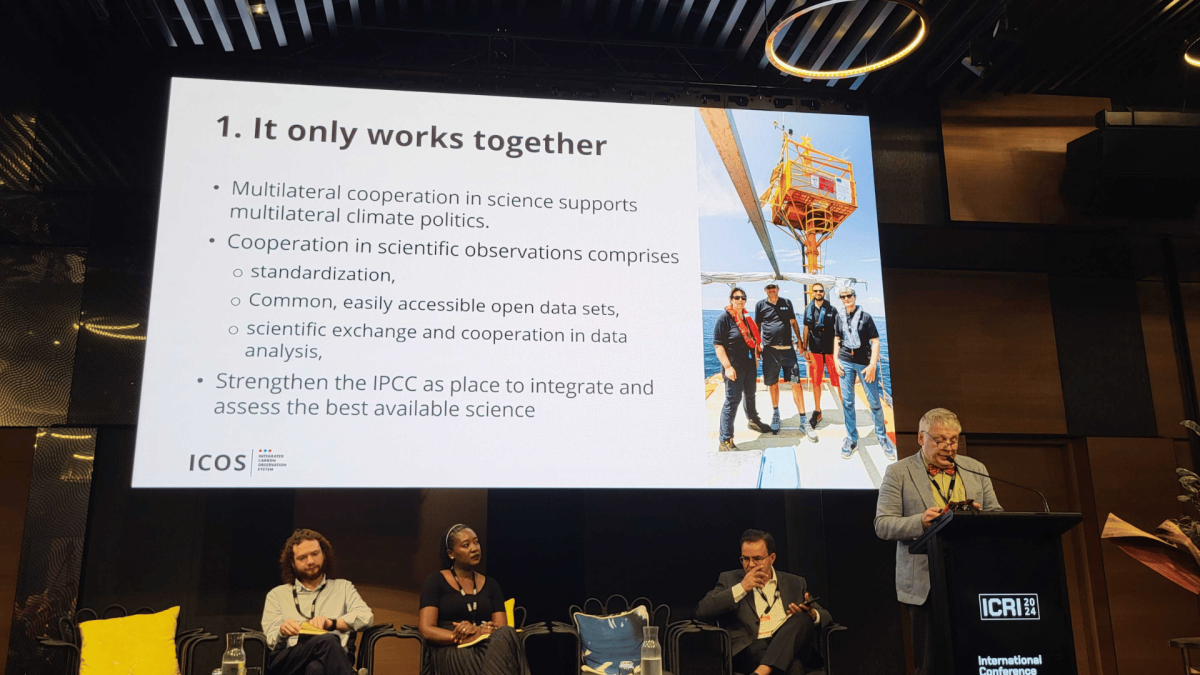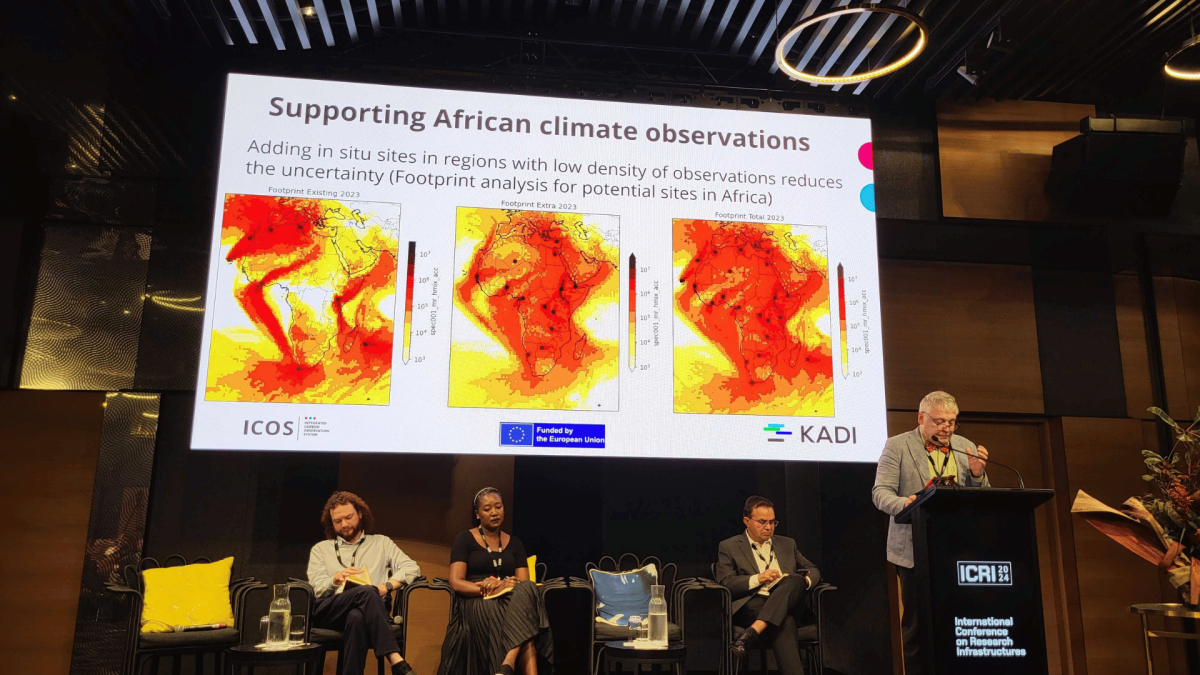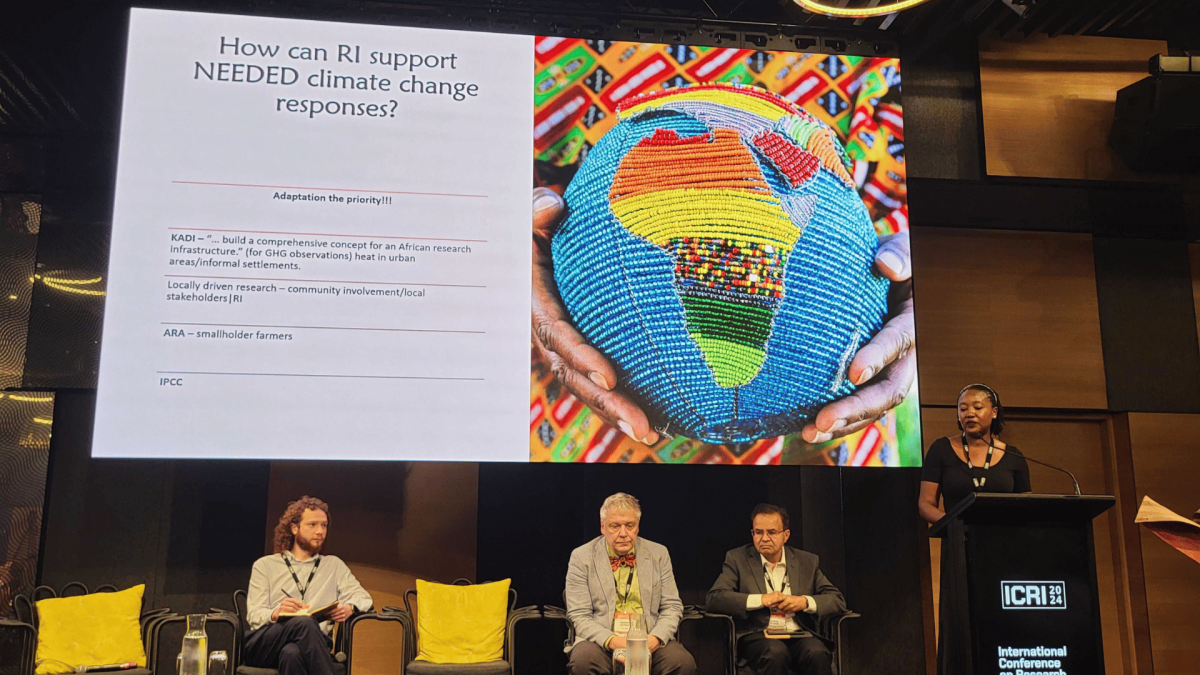
The International Conference on Research Infrastructures (ICRI) is a high-level stakeholder forum for the global research infrastructure (RI) community to discuss the role of RIs in tackling some of the world’s most pressing challenges. This year’s conference, held in Brisbane, focused on climate change and sustainability as central themes in the global research agenda. Representatives from ICOS and our collaborators from GERI and ENVRI community, as well as project partners from ENVRI-Hub NEXT, GEORGE, IRISCC and KADI were highly visible in the conference programme and presented new insights to reinforce the value of environmental RIs in addressing climate risks and advancing global sustainability.
ICOS highlights in the main programme at ICRI 2024
Two of the projects that ICOS is coordinating were well-represented in the main ICRI 2024 programme:
- KADI project partners Patricia Nying'uro (from Kenya Meteorological Department) and Werner Kutsch (from ICOS) spoke at the plenary session sharing their perspectives on How research infrastructure will address climate challenges over the next 30 years. Their presentations stressed the need for international cooperation, open science and fair distribution of funding opportunities for African research infrastructures
- GEORGE project partners Yann-Hervé De Roeck (from Euro-Argo) and Emmanuel Salmon (from ICOS) discussed the importance of Improving critical ocean and Earth observations. These presentations underscored the critical role of environmental RIs in providing the data, tools, and collaborations necessary for advancing climate science and sustainability efforts worldwide.
ICOS collaborations also showcased at ICRI side events
One of the side events at ICRI 2024 focused on the Global Ecosystem Research Infrastructure (GERI), a partnership of site-based research infrastructures dedicated to understanding the function and dynamics of indicator ecosystems across the globe. ICOS and eLTER from Europe collaborate with international counterparts including TERN (Australia), SAEON (South Africa), CERN (China), and NEON (USA).
The session provided an overview of recent GERI activities, including a comprehensive landscape analysis of research infrastructures and use case studies - such as investigations into ecological drought- leveraging data shared across partner RIs. Discussions also addressed the critical need for funding mechanisms across continents, engaging representatives from potential funding bodies to explore pathways for sustainable and collaborative support of GERI’s mission.
Furthermore, the IRISCC project side event focused on climate risks, showcasing how environmental RIs are directly contributing to climate change mitigation and adaptation. IRISCC highlighted the importance of international collaboration among RIs, with the aim of building resilience through data sharing and integrated climate services. The event provided a platform for discussions on the role of RIs in addressing climate risks, emphasising their impact on global policymaking and environmental strategies. The side event featured talks from ICOS (Werner Kutsch), eLTER (Michael Mirtl), and IRISCC project coordination (Janne Rinne).
The Brisbane Statement: A Call for Climate Action
The Brisbane Statement, which emerged from ICRI 2024, served as a key outcome of the conference. This statement placed climate change at the forefront of global research priorities and called for stronger international cooperation to address the climate crisis. It highlighted the pivotal role of Research Infrastructures (RIs) in driving climate action, promoting a green transition, and fostering sustainable development through innovation in research.
The Brisbane Statement urged stakeholders to continue strengthening international RI collaborations, ensuring that RIs remain central to global efforts in combating climate change. It also emphasised the need for RIs to contribute to policy development, technological advancements, and the integration of diverse data and perspectives in tackling the interconnected challenges of climate change, health, food security, and sustainable energy.
The Horizon Europe project NUBICOS supports several core points of the Brisbane Statement. NUBICOS deepens ICOS’s global collaboration with initiatives such as the World Meteorological Organization's Global Greenhouse Gas Watch (G3W) framework. NUBICOS also works to develop new climate services and data products for use among the wider climate science community, such as the remote sensing community. The project also has tasks dedicated to consolidating the existing ICOS community and training RI staff of the future.
Conclusion
ICRI 2024 reaffirmed the role ICOS and other environmental RIs play in driving global climate action. By highlighting the crucial role of RIs in supporting a green transition and addressing the urgent challenges of our time, the conference underscored the importance of continued collaboration, fair funding structures and interdisciplinary efforts to ensure a sustainable and resilient future for all.







This article is based on a version that was first published on the ENVRI website.